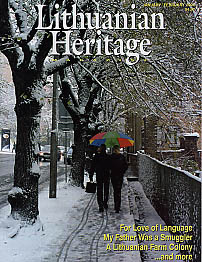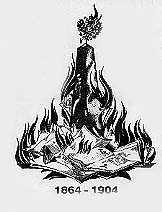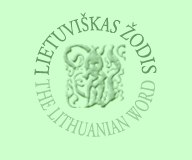-
 By
official Decree of Lithuanian Seimas (Parliament),
2004 has been designated as
the Year of the Lithuanian Language and Book." And UNESCO, the
cultural arm of the United Nations, included the commemoration of the
centennial of the restitution of the Lithuanian printed word into its
2004-2005 calendar of noted dates to be
remembered and commemorated throughout the world. This is a great
recognition for Lithuania, since only 40 events were selected for this
honor from all those submit- By
official Decree of Lithuanian Seimas (Parliament),
2004 has been designated as
the Year of the Lithuanian Language and Book." And UNESCO, the
cultural arm of the United Nations, included the commemoration of the
centennial of the restitution of the Lithuanian printed word into its
2004-2005 calendar of noted dates to be
remembered and commemorated throughout the world. This is a great
recognition for Lithuania, since only 40 events were selected for this
honor from all those submit-
ted by the 189 UNESCO member nations.
 The
Lithuanian printed word made its first appearance in the middle of the
16th century with the publication of the first book in the Lithuanian
language Martynas Mazvydas' "Catechism." Although
pressured by various forces, both internal and
external, the printed word
in Lithuania survived for centuries, and was the safeguard of language,
culture, and national identity during the Tsarist occupation and the
national renaissance in the 19th century. The
Lithuanian printed word made its first appearance in the middle of the
16th century with the publication of the first book in the Lithuanian
language Martynas Mazvydas' "Catechism." Although
pressured by various forces, both internal and
external, the printed word
in Lithuania survived for centuries, and was the safeguard of language,
culture, and national identity during the Tsarist occupation and the
national renaissance in the 19th century.
 But
Russian authorities would not allow this to continue. In order to
eradicate all forms of national aspiration and manifestation, after the
1863 revolt was
put down, the Tsar decreed that reading, teaching, and studying even
speaking in public places in the Lithuanian language would be
prohibited. And that the printing of books and newspapers would be
allowed only in the Russian language or in the Cyrillic alphabet,
commonly known as grazdanka (see page 12). But
Russian authorities would not allow this to continue. In order to
eradicate all forms of national aspiration and manifestation, after the
1863 revolt was
put down, the Tsar decreed that reading, teaching, and studying even
speaking in public places in the Lithuanian language would be
prohibited. And that the printing of books and newspapers would be
allowed only in the Russian language or in the Cyrillic alphabet,
commonly known as grazdanka (see page 12).
- This
"press ban" imposed in 1864 lasted for a period of forty
years, during which the language, culture, education, and even moral
standing of the Lithuanian nation stagnated and was in danger of
perishing. If not for the dedication and sacrifice of the
"book-carriers" (see page 14), today Lithuanian would be a
dead language joining the ranks of other dead languages, and Lithuanians
would be listed in encyclopedias as one
of the many ethnic groups that once inhabited Russia.
- Facing
strong resistance from the people, and fearing for his own survival, in
1904 the Tsar rescinded the decree and restored freedom of language and
press to the Lithuanians. Fourteen years later, they themselves restored
full freedom and national independence.
-
|

